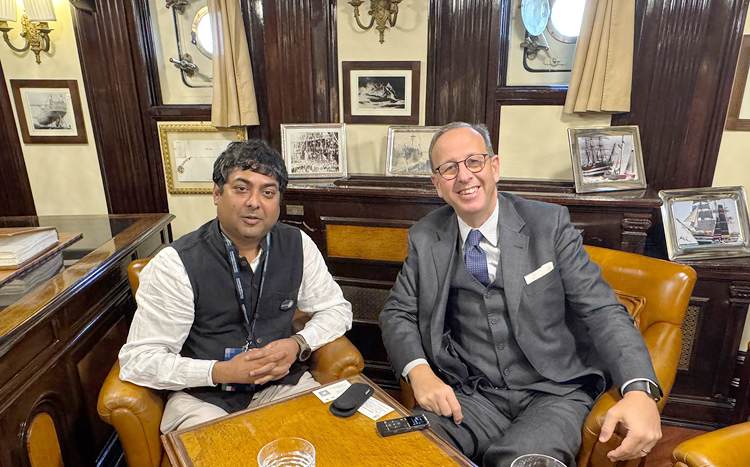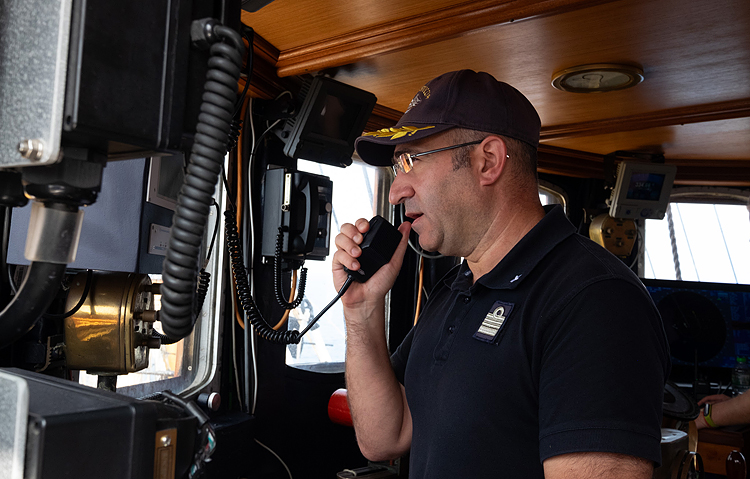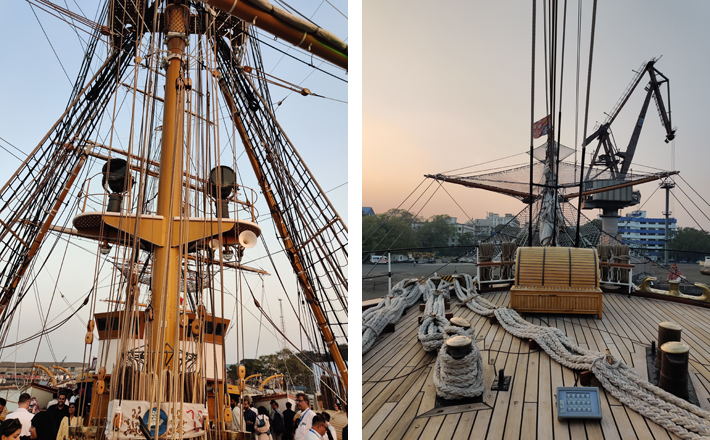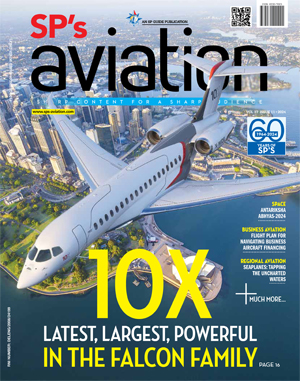INDIAN ARMED FORCES CHIEFS ON OUR RELENTLESS AND FOCUSED PUBLISHING EFFORTS

The insightful articles, inspiring narrations and analytical perspectives presented by the Editorial Team, establish an alluring connect with the reader. My compliments and best wishes to SP Guide Publications.

"Over the past 60 years, the growth of SP Guide Publications has mirrored the rising stature of Indian Navy. Its well-researched and informative magazines on Defence and Aerospace sector have served to shape an educated opinion of our military personnel, policy makers and the public alike. I wish SP's Publication team continued success, fair winds and following seas in all future endeavour!"

Since, its inception in 1964, SP Guide Publications has consistently demonstrated commitment to high-quality journalism in the aerospace and defence sectors, earning a well-deserved reputation as Asia's largest media house in this domain. I wish SP Guide Publications continued success in its pursuit of excellence.
Italy's legendary warship in India, reaffirms Strategic Security partnership with India, says Italian Ambassador Bartoli
A historic moment for Indo-Italian relations, on board the legendary, nearly a century-old Amerigo Vespucci --called the most beautiful ship in the world, and Villaggio Italia docked in Mumbai, Manish Kumar Jha speaks with Antonio Bartoli, Ambassador of Italy on the strategic relations and the great significance the Italian warship in India attaches to.

It signifies a compact security partnership with India. Onboard, Admiral Antonio takes me into his inner world, deep under the vessel, and tells me that Italy believes in India-cantered Indo-Pacific and Indo-Mediterranean for Italy to navigate the fiery geopolitics, laws of the sea, and democratic trade together. On this historic occasion, onboard Vespucci, Ambassador Bartoli speaks on a range of issues, including the Five-Year action plan issued after the meeting between Prime Minister Narendra Modi and his Italian counterpart Giorgia Meloni. Ambassador Bartoli outlines the defence manufacturing with India, especially the joint industrial military cooperation. While trade, technology, and space collaboration with Italy is a step up, India and Italy are also cooperating on the India - Middle East - Europe Economic Corridor (IMEEC). What is the progress? Innovation and defence technology: Italy and India are also deepening collaboration in advanced technology sectors, such as robotics, quantum computing, and unmanned systems. Along, Italy is moving boldly on military modernisation, specially building next-generation navies which are aimed at firmly placing Italy and claiming its position in next-generation military technologies. Ambassador Bartoli explains:
"Leading Italian companies like Leonardo and Fincantieri offer expertise in shipbuilding, electronic warfare, and avionics, aligning with India's 'Make in India' initiative for co-development and manufacturing in defence."
Manish Kumar Jha (Manish Jha): We see a lot of upsurge and momentum in Indo-Italian relations. What are the important elements?
Ambassador Bartoli (Amb Bartoli): India is a great country, particularly in innovation, ranking third globally in terms of the number of unicorns. We aim to facilitate dialogue and interaction between our startups, but not only in science and technology-mobility is also a key area. This is significant because our two governments have signed a mobility agreement, creating a win-win situation. With your population of 1.4 billion and over a million people entering the labour market monthly, and our gaps in the labour market, this agreement allows us to tap into your vast talent pool. Italy can bring in qualified personnel, provided they are trained here before departure, exceeding our migration quotas. For instance, we are working on a project involving nurses.
Another focus is the ecological and energy transition. Rapid economic growth has led to increased pollution in your country, which is widely acknowledged. While changing the energy mix overnight is impossible, your plan to rely on 50 per cent renewables by 2030 is promising. Italy excels in renewables, meeting over half of its electricity demand through them. We are also the EU's leader in waste segregation and recycling, with advanced green technologies. This sector presents opportunities for complementarity.
"The IMEC (India-Middle East-Europe Corridor) initiative revives historic trade routes connecting India and Rome, offering a stabilising force for the Middle East and fostering cooperation under the Abraham Accords."
Security, including cybersecurity, is another area of focus. We have initiated dialogues on cybersecurity. Beyond this, our collaboration extends to people-to-people ties, encompassing culture, tourism, and inter-university cooperation. With over 250 agreements between our universities, we are increasing the flow of students both ways. Prestigious institutions like Bocconi Milan and Marangoni have already established a presence in India. Across sectors, we have concrete ideas and specific projects aimed at achieving tangible results.

Manish Jha: Thank you for the opening remarks. As you highlighted, this is a historic moment, especially with the Vespucci warship docking in India for the first time in 92 years. What does this symbolise in terms of Italian tradition and geopolitics? How do you look at these two aspects converge in your broader foreign policy in the context of India?
Amb Bartoli: I often use the term complementarity to describe our relationship. It's not just about the chemistry between our leaders, but a shared pragmatic approach to governance-focused on national interest rather than ideological constraints. Historically and geographically, our civilisations have much in common. As two democracies and peninsulas-India in the Indian Ocean and Italy in the Mediterranean-we share convergences. The concept of the Indo-Pacific, popularised by leaders like Shinzo Abe, aligns with the notion of an Indo-Mediterranean. Both regions face common threats and share objectives.
We are two democracies and history and geography are uniting us. We are two peninsulas, projected in respected seas-you (India] in the Indian Ocean and we (Italy) in the Mediterranean.
"Italy's presence in the Indo-Pacific is not about projecting power but recognising interconnectedness, with a focus on holistic security and economic stability in geopolitics."
Vespucci's visit underscores our attention to this region. It's part of our increasing presence in the Indo-Pacific, evident from past initiatives like the Morosini's visit and joint exercises with the Indian Navy.
We had a joint strike Group, which was composed of an aircraft carrier, the Cavour, and the Frigate Alpino in Goa. We jointly exercised with the Indian Navy. This was unprecedented.
We have this Matei Plan that is developing a series of programmes and investments in Africa.
At the same time, India's growing interest in Europe and Italy aligns with our prominence in Africa and the Middle East. The IMEC (India-Middle East-Europe Corridor) initiative reflects this historic connection, reviving ancient trade routes that linked India and Rome. While some see the IMEC as ambitious, we view it as a potential stabilising force for the Middle East and a continuation of the Abraham Accords, fostering cooperation between Israel and moderate Arab nations.

Manish Jha: Ambassador, again, I would like to have more clarity. Given Italy's dual focus on the Indo-Pacific and Mediterranean, how do you balance these priorities within your foreign policy, especially in the context of military modernisation?
Amb Bartoli: Despite challenges to globalisation and multilateralism, geopolitics is increasingly interconnected. Security today demands a holistic approach. Events in the Pacific have tangible effects on global security and economics. For instance, disruptions in the Red Sea raise shipping costs, impacting prices globally. Thus, Italy's presence in the Indo-Pacific isn't about projecting global power but recognising that interconnectedness is essential for security and economic stability.
India, as a democracy and a major power, is an ideal strategic partner. The post-COVID focus on friend-shoring and near-shoring aligns with our goal of diversifying value chains. Beyond economics, we aim to deepen defence ties, with Italian companies ready to co-design, co-develop, and co-produce in India.
"Italy supports India's pursuit of a free trade agreement with the EU, emphasising the mutual benefits in manufacturing and protecting geographical indications for iconic products."
Manish Jha: Both Prime Ministers Modi and Meloni have elevated our partnership, particularly in defence. Italy has a long history of defence collaboration with India. Companies like Leonardo are keen to participate in India's 'Make in India' initiative. Could you elaborate on Italy's areas of expertise and interest in defence cooperation?
Amb Bartoli: Italy and India already collaborate in defence through missions like those in Lebanon and information exchanges in the Indian Ocean. Leading Italian companies such as Leonardo and Fincantieri, among the world's top 50 defence players, offer expertise in various technologies, including shipbuilding, electronic warfare, and avionics. For example, Fincantieri excels in both military and civilian shipbuilding, while companies like Beretta and Elettronica specialise in firearms and electronic warfare.
In addition to products, we recognise the importance of 'Make in India', contributing to India's manufacturing growth while fostering mutual trust. Italy, being Europe's second-largest manufacturing powerhouse, complements India's ambitions to expand its manufacturing sector.
Manish Jha: Lastly, Italy is part of a next-generation fighter jet programme in collaboration with the UK and Japan. Is there potential for India to join this initiative?
Amb Bartoli: Our alliance with the UK and Japan for the next-generation fighter jet is built on deep expertise. While the future holds possibilities for collaboration, space is another domain where we see immense potential. Italy has a strong presence in areas like Earth observation, precision agriculture, and infrastructure surveillance. We've also contributed significantly to the International Space Station. In space exploration and technology, Italy and India have much to gain from collaboration.
Manish Jha: Finally, with the historic Vespucci warship in India, how can Italy assist India in advancing its free trade agreement (FTA) negotiations with the EU?
Amb Bartoli: Reaching an FTA requires flexibility and commitment from both sides. Negotiations, restarted two years ago, are currently in a holding pattern due to changes in the European Commission. A comprehensive FTA would benefit both parties, particularly in sectors like manufacturing. Italian businesses, being largely mid-sized, rely heavily on trade and are affected by high duties. For Italy, protecting geographical indications is also critical, ensuring that iconic products retain their value in global markets. We remain committed to supporting mutually beneficial agreements that unlock economic growth for both nations.
Manish Kumar Jha is a Consulting & Contributing Editor for SP's Aviation, SP's Land Forces and SP's Naval Forces and a security expert. He writes on national security, military technology, strategic affairs & policies.





